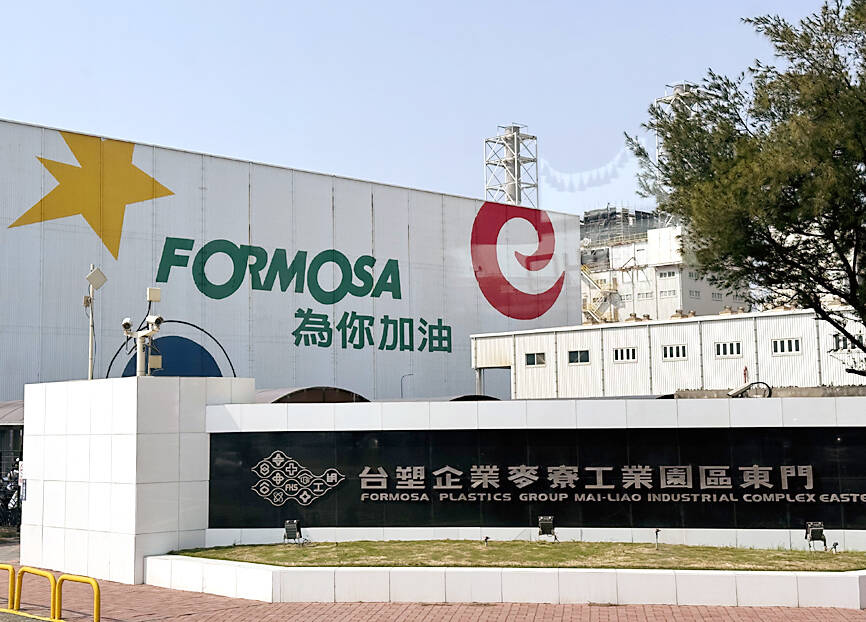Formosa Plastics Group (台塑集團), Taiwan’s largest industrial conglomerate, yesterday posted overall revenue of NT$118.61 billion (US$3.66 billion) for last month, marking a 7.2 percent rise from October, but a 2.5 percent fall from one year earlier.
The group has mixed views about its business outlook for the current quarter and beyond, as uncertainty builds over the US power transition and geopolitical tensions.
Formosa Plastics Corp (台灣塑膠), a vertically integrated supplier of plastic resins and petrochemicals, reported a monthly uptick of 15.3 percent in its revenue to NT$18.15 billion, as Typhoon Kong-rey postponed partial shipments slated for October and last month, it said.

Photo: CNA
The company is expecting a decline in revenue for this month, as it would idle more plants to cope with slack demand.
The financial performance for this quarter might hold steady compared with the previous quarter, without improving next quarter, it said.
The number of working days would decrease in the first quarter of next year due to the Lunar New Year holiday, but utilization rates would rise modestly with the advent of high season, it said.
US president-elect Donald Trump’s protectionist talk might prompt Asian customers to replenish inventory ahead of his inauguration to dodge tariff hikes, it said, adding that the company would be flexible and agile to meet customer demand.
Formosa Petrochemical Corp (台塑石化), engaged primarily in the business of refining crude oil, selling refined petroleum products and producing and selling olefins from its naphtha cracking operations, booked NT$51.24 billion in revenue, up 12.7 percent from one month earlier, as cold weather boosted energy demand but a supply glut weighed on international oil prices, it said.
The company aims to produce 426,000 barrels per day this month, keeping refining capacity at 71 percent and oil cracking capacity at 53 percent for this quarter, it said.
Formosa Chemicals and Fibre Corp (台灣化學纖維), which produces and sells petrochemical products, nylon fibers and rayon staple fibers in Taiwan and abroad, saw its revenue grow 2 percent to NT$27.25 billion on better market diversification practices, it said.
However, sales are set to decline this month, as China fails to emerge from the woods despite the introduction of stimulus measures and peace remains elusive in the Middle East, which is unfavorable for petrochemical products, it said.
Nan Ya Plastics Corp (南亞塑膠), whose main business involves making processed plastic and chemical products, electronic materials and polyester fiber, recorded NT$21.97 billion revenue, a 3.5 percent retreat from October, attributable to the low season and the Thanksgiving holiday in the US, the firm said.
Business would improve somewhat this month but stagnate next quarter due to the Lunar New Year holiday in Taiwan, it said.

Taiwan Semiconductor Manufacturing Co (TSMC, 台積電) secured a record 70.2 percent share of the global foundry business in the second quarter, up from 67.6 percent the previous quarter, and continued widening its lead over second-placed Samsung Electronics Co, TrendForce Corp (集邦科技) said on Monday. TSMC posted US$30.24 billion in sales in the April-to-June period, up 18.5 percent from the previous quarter, driven by major smartphone customers entering their ramp-up cycle and robust demand for artificial intelligence chips, laptops and PCs, which boosted wafer shipments and average selling prices, TrendForce said in a report. Samsung’s sales also grew in the second quarter, up

On Tuesday, US President Donald Trump weighed in on a pressing national issue: The rebranding of a restaurant chain. Last week, Cracker Barrel, a Tennessee company whose nationwide locations lean heavily on a cozy, old-timey aesthetic — “rocking chairs on the porch, a warm fire in the hearth, peg games on the table” — announced it was updating its logo. Uncle Herschel, the man who once appeared next to the letters with a barrel, was gone. It sparked ire on the right, with Donald Trump Jr leading a charge against the rebranding: “WTF is wrong with Cracker Barrel?!” Later, Trump Sr weighed

LIMITED IMPACT: Investor confidence was likely sustained by its relatively small exposure to the Chinese market, as only less advanced chips are made in Nanjing Taiwan Semiconductor Manufacturing Co (TSMC, 台積電) saw its stock price close steady yesterday in a sign that the loss of the validated end user (VEU) status for its Nanjing, China, fab should have a mild impact on the world’s biggest contract chipmaker financially and technologically. Media reports about the waiver loss sent TSMC down 1.29 percent during the early trading session yesterday, but the stock soon regained strength and ended at NT$1,160, unchanged from Tuesday. Investors’ confidence in TSMC was likely built on its relatively small exposure to the Chinese market, as Chinese customers contributed about 9 percent to TSMC’s revenue last

LOOPHOLES: The move is to end a break that was aiding foreign producers without any similar benefit for US manufacturers, the US Department of Commerce said US President Donald Trump’s administration would make it harder for Samsung Electronics Co and SK Hynix Inc to ship critical equipment to their chipmaking operations in China, dealing a potential blow to the companies’ production in the world’s largest semiconductor market. The US Department of Commerce in a notice published on Friday said that it was revoking waivers for Samsung and SK Hynix to use US technologies in their Chinese operations. The companies had been operating in China under regulations that allow them to import chipmaking equipment without applying for a new license each time. The move would revise what is known